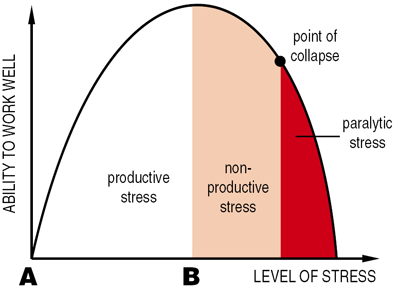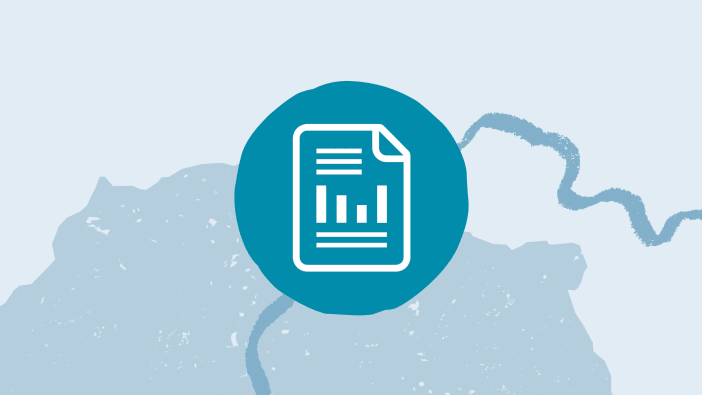However, as the amount of this kind of stress increases, we feel more and more pressured. As time goes on we get more and more worried. Eventually we reach a point where we no longer cope very well with these very difficult situations. All our energy becomes taken up with our own survival. This could be called non-productive stress.
If levels of stress continue to build, there is a further level of stress which we can call paralytic stress. The person is now at the point of collapse and quite unable to work at all. This extreme state needs specialist help.
The simple diagram below shows these three types of stress. Between points A and B the worker is able to work to the best of his or her ability. However, once point B is passed, the worker is able to work less and less effectively. In real life there are no sudden changes to tell that someone has passed into non-productive stress. Instead there are a number of warning signs.
Stress warning signs
Physical signs…
- ulcers
- headaches
- feeling tired
- difficulties with sleeping
- panic attacks
Mental signs…
- sense of failure
- anger and resentment
- wanting to run away from a situation
- inability to concentrate on what someone is saying
- suspicion of others
- difficulty in making decisions
- depression
Spiritual signs…
- God seems distant and uncaring
- no enthusiasm about serving God
- loss of joy in relationship with God
- emphasis on God’s judgement rather than his mercy
Other people may not notice any of these signs for a long time. The person may have a mixture of any of the above signs, but they would not have been typical of the person before they began to cope with a stressful situation.
How to deal with stress…
- Ask God to provide you with extra resources to help with the difficult situation which you face. He has promised to equip us with all we need to serve him.
- If possible, try to remove some of the stress. For example, if there is a difficult relationship with a fellow worker, try and talk openly about the problem. Of course, in the case of a disaster it may not be possible to remove the stress.
Develop ways of coping with the stress…
- Give proper attention to your health and to time for relaxing.
- Talk about your feelings with others. • Look again at the way you work – are you setting impossible deadlines and targets?
- Learn to delegate – and share responsibilities.
- Count your blessings, not your problems, and live each day as it comes.
- Be open to receiving support, help and encouragement from others – friends, family, fellow church members and workers.
Mike Wall is in charge of the Disaster Response Unit, Tear Fund UK.








